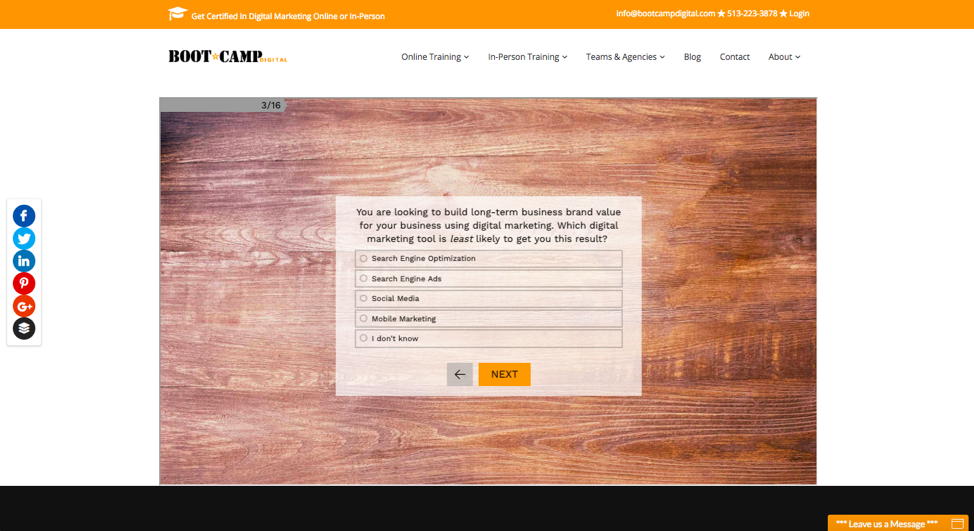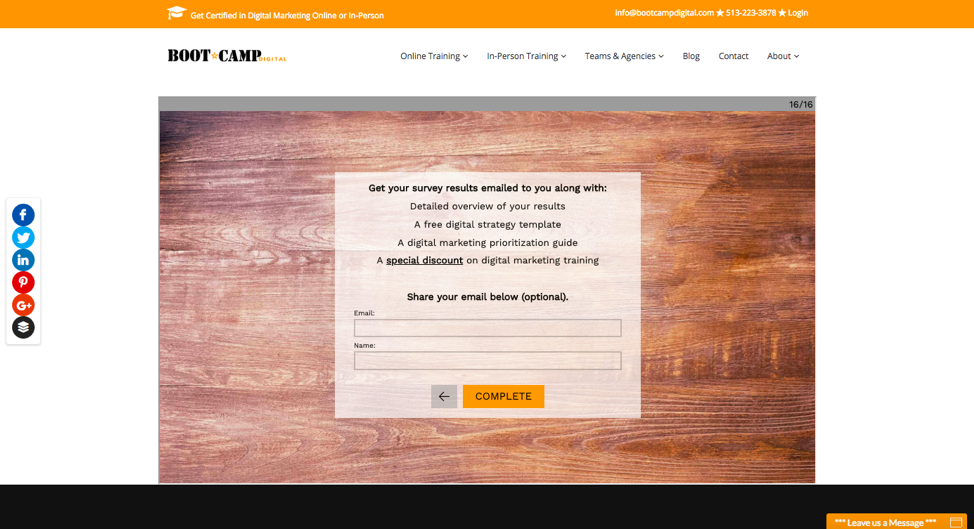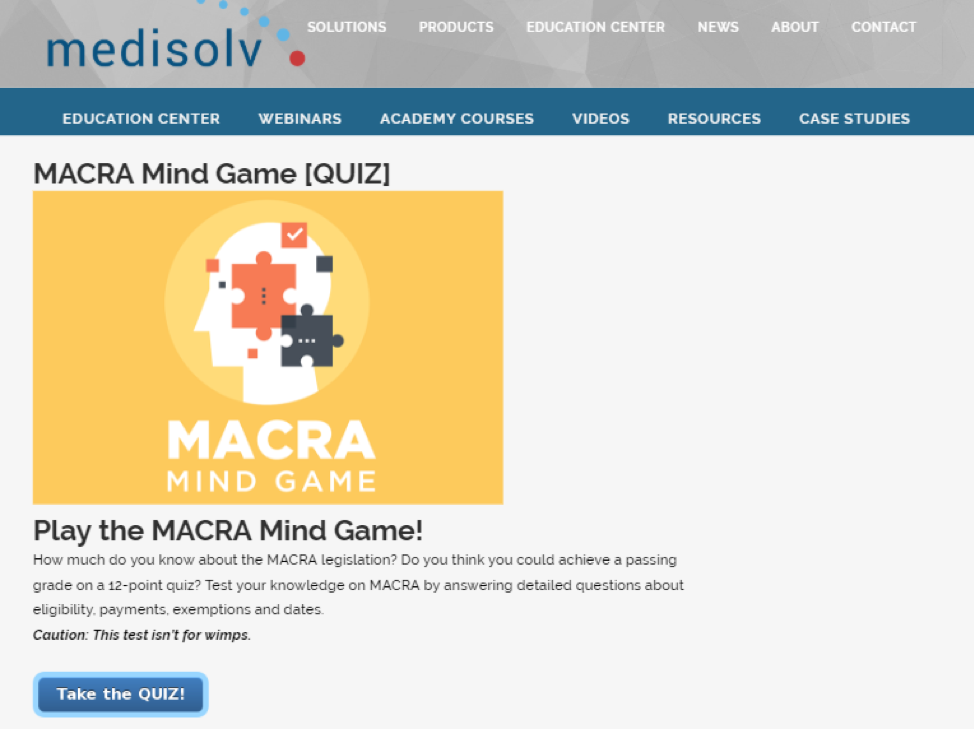How To Use Quizzes To Increase Student Success In Online Courses
There’s a difference between sitting through courses – having information directed at you – and really learning about what is being presented. Effective online course creators understand that their work can bridge that gap.
Think about when you were a student in class – which lessons have stuck with you throughout the years? Which facts are seemingly lodged in your brain until the end of eternity? Which teachers or professors were able to help you dive deep into their subjects and emerge with long-lasting knowledge? What techniques did they use?
Undoubtedly, they made you take tests or quizzes. While surely not the most fun experience throughout school, quizzes ensure that you review, comprehend and remember bits of knowledge. While most people look back on taking school quizzes as stressful situations, what if we told you that doesn’t always need to be the case?
What if we told you that quizzes can – in fact – attract people to your courses and make taking the courses an engaging and interactive experience?
Quizzes are definitely something you should consider when creating your online course. Here are our recommendations on ways they can be used to complement your hard work and tips on building the best quiz for your lessons.
3 ways to attract and engage your students with online quizzes
Interactive quizzes and assessments cement information presented in online courses into solid learning experiences that students retain long-term. But these tools have the potential to do so much more than that. They can also be seen as the vehicles to both deliver people to your course and keep students engaged so that they continue to participate.
Strategy #1: Before the course (for lead generation)
Your course could be the best thing that has ever existed on the internet, but it will remain quite useless without people seeing it. With all the noise out there, capturing an audience’s attention is not an easy feat. However, there are several approaches to generate leads, as CustomerCentric Selling Chief Content Officer John Holland explained:
“We use a digital mix of blog, email, social media and customer marketing assets like success stories and videos to generate leads for our training courses. On the flip side looking at it from the general sales point of view, many of our own Business Partners enjoy the luxury of having clients provide referrals which eases the burden of having to generate new leads.”
Lead generation quizzes are also a helpful tool for attracting potential students. They accomplish the following:
- Direct participants to the most appropriate course
- Help you better understand participant needs and preferences
- Decrease your cost per lead by up to 90 percent
One website that does this well is Boot Camp Digital, which provides courses focused on digital marketing. One way they attract virtual students is through their Digital IQ Test. They provide a short and long quiz to test participants’ digital marketing knowledge with multiple-choice questions such as, “You want to reach new people in your target audience who are actively looking for your product. Which is the best digital marketing tool to reach them?”

Once you finish answering the questions in the quiz, a screen appears telling you to submit your email and name in order to receive the results, a free digital strategy template, a digital marketing prioritization guide and a discount on training.

This quiz accomplishes a few goals – grabbing potential participants’ attention, helping them realize what they do and do not know about digital marketing, and encouraging them to hone their skills through the online course.
Bonus Tip: Lead generation quizzes work very well in combination with Facebook Ads. People are more willing to participate in a quiz than click on a traditional banner ad.
Strategy #2: During the course (for engagement and participation)
It’s no secret that as technology pulls our focus in every direction, human attention spans are not long. In fact, some studies go as far as to say that the human attention span is now eight seconds – less than a goldfish’s nine seconds – though that statistic has been refuted.
Either way, we have a million things demanding our attention at once, so it can be challenging to keep someone focused on your content for long periods of time.
However, if created and utilized correctly, quizzes encourage learners to concentrate on the task at hand and to keep working through the course. One way to ensure that happens is by strategically placing quizzes throughout the lesson plans. Content Marketing University Program Manager Kim Borden said they include assessments at the end of each module:
“Because our learners come in at various levels in their content marketing expertise, assessing their knowledge at the end of the learning module allows us to understand any gaps we may have in our program, and because we offer a certificate of completion, it does ensure that the student has grasped the concepts being taught.”
Another way to accomplish this is by offering information immediately. One business that does this is Medisolv, which provides quality reports for hospitals. Medisolv built a quiz that helps people discover how much they know about a particular piece of legislation called MACRA. While legislation quizzes don’t sound like a fun use of time, Medisolv uses immediate response insight to keep participant attention focused throughout the assessment.

After participants answer each question, they are immediately informed whether they have done so correctly. The quiz also includes an explanation of why the questions are correct or incorrect, breaking up the information and making it easier to comprehend. Once participants finish the quiz, they receive their total score as well as more information about the legislation.
Including various forms of media also helps keep your respondents engaged in quizzes, and in turn, your course. Changing up the media in quizzes helps avoid a feeling of redundancy, encouraging participants to work through to the end. Websites such as Pikwizard, Pixabay, and Giphy provide media that is free to use.

Lastly, quizzes can be used to gamify your course, raising the stakes and, frankly, making it a more fun experience. Using assessments to add gaming mechanics to your course will keep respondents motivated. Make sure to show participants their scores and progress, and keep them engaged even more by offering a reward at the end.
Willis Turner, CEO of Sales & Marketing Executives International, said gamification has been an important component of his courses:
“We utilize a dashboard that gamifies the learning experience and allows the learner and the instructor to gauge the progress through the course. We also use discussion boards to create opportunities for learners to engage with instructors and with each other. In some of our courses, instructors send out weekly reminders with lesson plans to help keep learners on track.”
Strategy #3: After the course (for retention and cross-selling)
You have attracted your students and kept them engaged through the course – now what?
Before you bid them farewell, well, don’t. Instead, use surveys to ask for feedback on participants’ experiences with the online course. Ask them what they enjoyed as well as where they feel extra support would have been helpful. Knowing that you value their feedback and experience helps foster loyalty, making them more likely to return in the future.
Follow-up quizzes – which are typically sent by email – provide an opportunity to show how much knowledge has been retained as well as additional information about different courses. Don’t let your audience log off from your course to never return. Give them the resources to continuously come back.
Final Quiz Creation Tips for Online Courses
While quizzes are useful tools for online courses, their benefits are only seen if built out effectively. Here are a few tips:
- Include a compelling title for your quiz, just as you should for your online course.
- Make sure the quiz is mobile-friendly because more than 50 percent of them are taken on mobile devices.
- Write the questions in a conversational tone. In general, people prefer to be spoken with, not to.
- Ensure it is designed in an appealing manner. Respect a few basic design principles: use one to two colors, including white space, keep text in a single font and respect alignment. Most software tools have quiz templates available for those pressed for time or uncomfortable with designing their own assessments from scratch.
- If possible, include a variety of question types such as multiple-choice and picture questions.
- Make sure the assessment is personalized, which can be accomplished with features such as follow-up questions that pop up based on answers previously given. A more advanced way of personalization is to send a PDF report with personalized content based on the participant’s answers.
Quizzes help students retain information for years to come, but they are also useful tools for before, during and after online courses. They have ample potential to take your course to the next level, so get started!
How To Increase Student Success In Online Courses Using Quizzes @sde77 #teachonline #studentsuccess #onlinecourses Share on X
Stefan Debois is the founder and CEO of Survey Anyplace, an online software tool to create engaging surveys, quizzes, and assessments. Besides kitesurfing, Stefan is passionate about the use of technology to build mutually beneficial relationships with people, at scale.





Post Comment